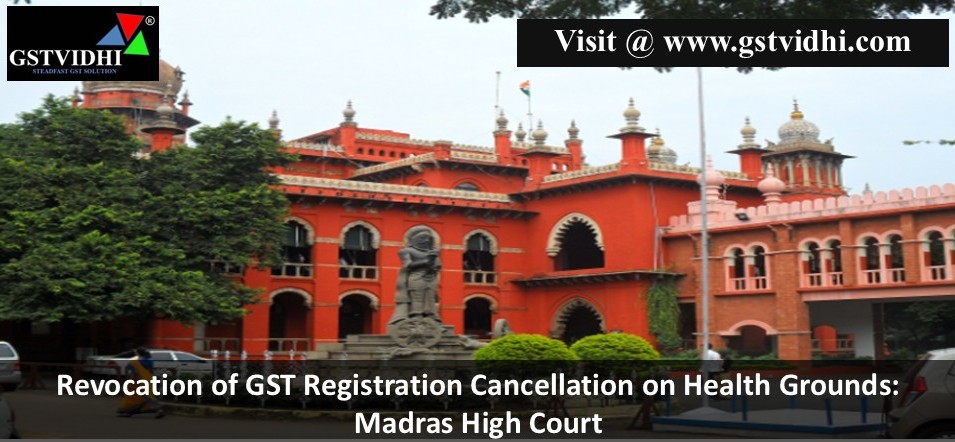
Revocation of GST Registration Cancellation on Health Grounds:
Madras High Court
1.
Introduction
The cancellation of GST
registration has become one of the most litigated issues under the Goods and
Services Tax regime. While cancellation is a statutory power vested in tax
authorities, its arbitrary or mechanical use often results in severe consequences
for small businesses, professionals, and proprietorships. The Madras High
Court, in the case of Chandrasekar Balasubramanian vs. Superintendent of
CGST & Central Excise (W.P. No. 29038 of 2025, decided on 05.08.2025),
addressed this sensitive issue in the context of a taxpayer who failed to file
GST returns due to serious ill health.
The judgment is
significant because it recognizes genuine human limitations such as
illness as valid grounds for judicial intervention, while also balancing
revenue protection by imposing conditions for restoration.
2. Case
Details
- Case Name:
Chandrasekar Balasubramanian vs. Superintendent of CGST & Central
Excise
- Court:
High Court of Judicature at Madras
- Coram:
Justice Krishnan Ramasamy
- Writ Petition No.:
29038 of 2025 (with W.M.P. No. 32571 of 2025)
- Date of Order:
05 August 2025
- Petitioner:
Mr. Chandrasekar Balasubramanian, Proprietor of M/s Chandras
Consultancy, Chennai
- Respondent:
Superintendent of CGST & Central Excise, Royapettah Range, Egmore
Division, Chennai North Commissionerate
- Impugned Order:
Order in Form REG-19, Ref. No. ZA330424094256J dated 22.04.2024 canceling
the GST registration of the petitioner
- Relief Sought:
Quashing of the cancellation order and restoration of GST registration
3. Factual
Background
The petitioner, Mr.
Chandrasekar Balasubramanian, is a sole proprietor running a consultancy
service under the name M/s Chandras Consultancy in Chennai. He was
registered under the Goods and Services Tax Act, 2017.
Due to serious health
issues, the petitioner could not file GST returns for a continuous period
of more than six months. As a consequence, the respondent authority, exercising
powers under Section 29(2)(c) of the CGST Act, 2017, issued an order
dated 22.04.2024 in Form REG-19, cancelling his GST registration.
Aggrieved by this, the
petitioner filed a writ petition before the Madras High Court, challenging the
cancellation order as being violative of Article 14 and Article 19(1)(g) of
the Constitution of India, since it deprived him of his right to carry on
business without providing an opportunity of hearing.
4.
Submissions by the Petitioner
Through counsel Mr.
M.S. Krishnakumar, the petitioner made the following submissions:
1. Genuine
Reason for Non-Compliance
o The
petitioner was suffering from health-related issues, which prevented him from
filing GST returns for more than six months.
o His
inability to comply was not willful or deliberate.
2. Willingness
to Comply
o The
petitioner expressed readiness to file all pending returns and discharge the entire
tax liability along with interest and penalty.
o He
sought restoration of registration to continue his business lawfully.
3. Violation
of Principles of Natural Justice
o The
cancellation was done without affording the petitioner a reasonable opportunity
to explain his circumstances.
o This
violated the mandate of Article 14 (equality before law) and Article
19(1)(g) (freedom to practice any profession, occupation, trade, or business).
5. Defence
by the Respondent
Represented by Mr.
Rajendran Raghavan, Senior Panel Counsel, the respondent made candid
submissions:
1. Cancellation
is Statutory
o The
petitioner had admittedly not filed GST returns for more than six months,
justifying cancellation under Section 29(2)(c).
2. No
Objection to Restoration with Conditions
o Since
the petitioner voluntarily undertook to pay the tax dues with applicable
interest and penalty, the respondent had no objection if the Court restored the
registration, subject to conditions safeguarding revenue.
6.
Observations of the Court
Justice Krishnan Ramasamy
carefully analyzed the facts and made the following important observations:
1. Health
Grounds are Genuine
o The
Court found the petitioner’s explanation of ill-health to be credible and
genuine.
o Non-filing
of returns was not an intentional default but due to circumstances beyond
control.
2. Cancellation
Order was Harsh
o Cancelling
GST registration for genuine reasons amounts to disproportionate punishment,
especially when the taxpayer expresses willingness to comply.
3. Balance
Between Justice and Revenue
o The
Court emphasized that while taxpayer rights must be protected, the State’s
revenue interests must also be safeguarded.
o Therefore,
restoration could only be allowed subject to conditions.
7. Final
Decision
The Court revoked the
cancellation order dated 22.04.2024 and restored the GST registration of
the petitioner, subject to strict conditions:
1. Filing
of Returns
o The
petitioner must file all pending returns up to date within four weeks from the
restoration of registration.
2. Payment
of Tax and Dues
o All
pending tax liabilities must be paid with interest and late fees.
3. Restriction
on ITC
o No
adjustment of tax dues against unutilized Input Tax Credit (ITC) will be
allowed unless scrutinized and approved by a competent authority.
4. Future
Use of ITC
o Only
verified and approved ITC may be utilized for discharging future tax liability.
5. Automatic
Cancellation if Non-Compliance
o If
the petitioner fails to comply with any of these conditions, the benefit of
restoration will automatically cease.
The writ petition was
accordingly disposed of without costs.
8.
Conclusion and Implications
The Chandrasekar
Balasubramanian case reiterates that courts will intervene to prevent mechanical
cancellations of GST registrations when taxpayers provide valid
justifications for non-compliance.
Key takeaways:
- Humanitarian Consideration:
Courts will recognize genuine difficulties such as health issues as valid
grounds for relief.
- Conditional Relief:
Restoration will not be unconditional; taxpayers must clear dues with
interest and penalties.
- Strict ITC Scrutiny:
The judgment highlights judicial caution against misuse of unutilized ITC,
requiring verification before utilization.
- Balanced Approach:
The case strikes a balance between taxpayer rights and revenue protection,
ensuring fairness in GST administration.
Disclaimer: All the Information is based on the notification, circular advisory and order issued by the Govt. authority and judgement delivered by the court or the authority information is strictly for educational purposes and on the basis of our best understanding of laws & not binding on anyone.
Press On Click Here To Download Order File
Click here